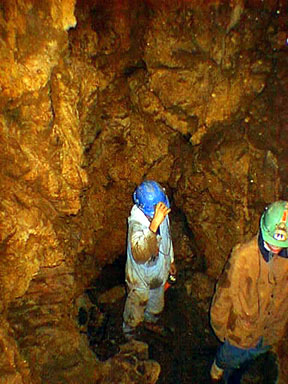22. Leigh Cavern
Leigh Cavern is located about half a mile southwest of the Round Valley Reservoir's South Dam along the valley of Prescott Brook. Unfortunately, the cavern is not open to the public, per-se... It is on posted state property with a locked gate. Access is limited to experienced guides and trained guests. Access to the cave is provided only by unscheduled trips with an area grotto (a spelunking society). This cavern is mentioned here only because of its geologic significance. The entrance to the cave is cemented shut with a locked door on the inside end of a small pipe (big enough for a skinny adult)(Figure 50). Another air vent is big enough for bats to fly through. It is a typical wild cavern, in that it requires rugged climbing and crawling through unlighted slippery and muddy passages with numerous dangerous pits, crevices, and claustrophobic tight squeezes. Although it is perhaps the largest known cavern in New Jersey, it is really a small cave with only about 800 feet of mapped passages.
 |
| Figure 50. Spelunkers covered with mud in Leigh Cavern. |
Leigh Cavern is a solution cavern developed in Ordovician Leithville Dolomite. However, the roof of the cavern is Precambrian granite gneiss! This is because the cavern underlies a thrust fault. The cave was discovered by blasting in a quarry (now abandoned). The thrust fault is well-exposed on the high wall of the quarry above the cavern entrance. There are numerous smaller faults and fractures through both the granite gneiss and underlying dolomite. It is along these fractures that the irregular passages of the cavern formed. In the cavern there are no significant travertine speleothems (stalactites or stalagmites). This is perhaps because the water trickling into the cave passes through gneiss, and therefore, calcite is unavailable to be precipitated in the cavern.
| Return to the Highlands Province Main Page. |